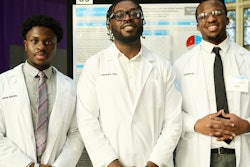A task force formed by The Steve Fund — a nonprofit focused on the mental health of youth of color — recently released a report that advises colleges and employers on how best to help students of color with mental health issues in the wake of the COVID-19 pandemic, a struggling economy and ongoing racial strife.
The Steve Fund Crisis Response Task Force is composed of 21 members, including students, mental health experts, higher education administrators, corporation executives and nonprofit leaders.
 Ryan Houston-Dial
Ryan Houston-DialRyan Houston-Dial, a senior at the University of Texas at San Antonio and one of two students on the task force, explained how the dueling pandemics of COVID-19 and systemic racism have affected his mental health.
At home, he sometimes feels “cabin fever” and anxiety due to remote learning and social distancing. But he also has reason to fear going outside, worried that he could get pulled over by the police “and that could be the end of my life,” Houston-Dial said.
Dr. Carlota Ocampo, provost and vice president of academic affairs at Trinity Washington University and a member of the task force, said that widening inequities are now made apparent by the ongoing pandemics.
“What we found was so many of society’s inequities were uncovered when students suddenly needed to go online in the middle of the spring semester,” she said. “It highlighted the inequities of the healthcare system, in educational preparedness and the technological divide.”
The task force recommends that colleges and universities pay particular attention to racial trauma. Last week, Trinity Washington unveiled Trinity DARE (Driving Actions for Racial Equity), a bold initiative designed to improve the economic and social opportunities for Trinity students and their families.
“We really want to encourage racial trauma-informed leadership so that the leadership in academic institutions can really develop empathy towards the experiences that students of color have and to make sure that they have that empathy front and center when they’re creating resources that respond to the needs of students,” Ocampo said.
 Dr. Carlota Ocampo
Dr. Carlota OcampoOcampo — who holds a Ph.D. in neuropsychology — emphasized the importance of recognizing where the problem in racial trauma lay.
“There’s always a difficulty in talking about [racial trauma] because some people feel that it pathologizes an ethnic experience, and, that by virtue of being a person of color, you’re going to have this trauma,” Ocampo said. “The problem is that it’s not a problem that’s endemic to being a particular ethnicity.
“It’s a problem that society creates experiences that may be traumatic for people of color and we need to recognize those and address them, rather than blaming the victim.”
Other recommendations for higher ed institutions include encouraging interdepartmental collaboration, partnering with local communities and businesses and keeping mental health funding a priority, even during periods of financial hardship.
Ocampo said that now, while the economy struggles, administrators in higher education may consider diversity programs as “extra” and may choose to abandon them as such.
“Don’t let that go,” Ocampo cautioned. “You need to prioritize this, because this is what’s going to make sure that your students are able to stay in school and complete.”
Recommendations for employers include easing the transition from college to the workplace, training leaders to discuss matters of diversity and mental health and reviewing company practices and culture to account for today’s stressors and inequities.
“Worries are arising amongst experts about the exacerbation of risks to well-being and success in the current context,” stated the report. “For instance, ‘with fewer connections and less extensive networks than white colleagues to begin with, Black and Hispanic workers can find themselves more isolated than ever in a world of Zoom calls and virtual forums.’”
There are incentives for higher ed institutions and employers to adopt the task force recommendations.
Ocampo said that supporting students is crucial to the success of college and universities, which are “scrambling for enrollment” these days.
“But enrolling the students is not enough,” she said. “If you’re going to meet your success metrics that enable you to stay viable as an institution, you are going to have to make sure that you provide the kinds of supports that are necessary for your students to stay in school, graduate and also thrive.”
Similarly for employers, having employees be healthy and productive in a workplace will help a company be profitable in the long run, said Sandra Timmons, interim executive director of The Steve Fund.
Houston-Dial said that he wants to see more comprehensive support.
“I want to see that support, that proactiveness, that we’re not waiting until things go left, to try to hurry up and try to put it all together,” Houston-Dial said. “No, let’s have some things in place so that we know our students are supported and can be a little bit more at ease.”
Arrman Kyaw can be reached at [email protected]


















